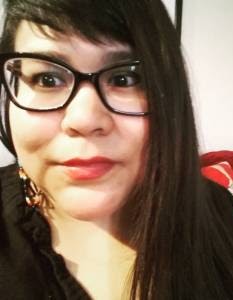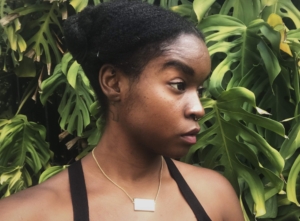Can There Be Justice?: An Interview with Casandra López
 Casandra López is a California Indian (Cahuilla/Tongva/Luiseño) and Chicana writer. She is the author of the chapbook, Where Bullet Breaks, and the poetry collection, Brother Bullet (University of Arizona Press, 2019). Her memoir-in-progress, A Few Notes on Grief, was granted a 2019 James W. Ray Venture Project Award. López has been selected for residencies with the School of Advanced Research, Storyknife Writer’s Retreat, Hedgebrook, and Headlands Center for the Arts, and she has received support from CantoMundo, Bread Loaf, and Tin House. She’s a founding editor of As/ Us and teaches at Northwest Indian College.
Casandra López is a California Indian (Cahuilla/Tongva/Luiseño) and Chicana writer. She is the author of the chapbook, Where Bullet Breaks, and the poetry collection, Brother Bullet (University of Arizona Press, 2019). Her memoir-in-progress, A Few Notes on Grief, was granted a 2019 James W. Ray Venture Project Award. López has been selected for residencies with the School of Advanced Research, Storyknife Writer’s Retreat, Hedgebrook, and Headlands Center for the Arts, and she has received support from CantoMundo, Bread Loaf, and Tin House. She’s a founding editor of As/ Us and teaches at Northwest Indian College.
* * *
Following her brother’s murder, López has tasked herself with understanding her responsibilities to the world, to her family, to the living, to the dead, to herself. She sits with grief and grief sits with her, its interminable face always meeting her gaze. She writes about the exchange. Antioch University’s MFA program was fortunate to receive López via Zoom and her lecture about the ethics of writing trauma. I was fortunate to converse further with her on humanity, patience, accountability, compassion, and honesty, and how they all exist together.
RaeJeana Brooks: Is there a question that you’re trying to answer for yourself right now?
Casandra López: In writing—and this goes for any genre—there’s always a question that you’re looking [to answer]. If you start off thinking you know the answer, it’s not going to turn out. I think you have to allow yourself to be open to the discovery process. In the first book [I wrote], I think the question was: How do I live with this loss of my brother, or how does my family live with this loss of my brother?
In this memoir, the question is: what does justice look like? What can justice look like for my community? Especially in my brother’s case, which is unsolved. I don’t think we’re going to get justice in the court system, whatever that may mean. Can there be justice? One of the leading questions in this book is “how does one brown man kill another brown man? How does someone from the community kill someone else from the community?” That question led to exploring the present situation in my community, but also how we got there—a historical perspective on colonization. Colonization, which strips the humanity from someone. The book I’m working on looks at that.
RB: Is it true Brother Bullet took nine years to create?
CL: Yeah! I started writing it almost immediately after my brother passed away in 2010, and it was published in 2019. There were definitely breaks. The bulk of it was probably written in 3 or 4 years. I sent it out, got rejected, took a break, went back, tried to revise it again, sent it out, got rejected, and then the publishing took maybe two years. It took some time. A part of me is glad that it did.
I wanted it to be [reflective] of that time, those first years, when I was processing that grief versus where I am now with it. I wanted to really honor and respect that. That’s why I went in with a lighter touch rather than taking it completely apart. And if I’d decided to do that, it might’ve taken another ten years!
RB: What was it like to write your current project, A Few Notes on Grief?
CL: What happened was that I wrote a poem and realized its voice sounded very different from the voice of other poems I’d written. I saw myself moving.
I don’t know if people talk about this… I’m definitely proud of [A Few Notes on Grief], and I’m happy to have something I can give to my family, that I can give to my niece and nephews, something of my memories—but my brother’s still not alive. It’s not magic. To me, it was celebratory, but it was still just a book.
Something I did not expect—I’ve felt very connected with other people who’ve experienced their own close loss, especially to gun violence. I’ve been able to speak with them and I really feel a sense of kinship. I’m glad they could appreciate my words in a way that others might not be able to. I know that, for me, poetry and literature have been an escape, a way for me to process things, so to be a part of another person’s processing is really cool.
RB: During your lecture, you said something I love: “Undress my pain on the page.” How are you able to undress your pain while simultaneously working through it? Do you struggle with it?
CL: A lot of what I’m working through right now is my own shame. That’s layered. When you have shame about something, it’s from society or family. You have to break through all of that. I can maybe do that in one essay or section or poem. You have to work through that continuously.
Years ago, my family house was raided because of the war on drugs. False information led to the raid and I had shame about it for a long time. But over the years, I realized it could’ve been way worse. There have been people killed, people who’ve been disfigured by these often violent police raids. Right now, I feel very compelled to write about it because I feel [these events are] in conversation with what happened to Breonna Taylor and others. It’s pushing me to get over my shame about it.
I think I need to write about it in a sociopolitical context, where it’s not just my pain and the shame of what happened to my family that we’ve tried to put aside and move on from. My family was severely affected by this, so I feel this is something I want to write about instead of burying. We are not the only family to experience this type of thing.
As painful as it is to dig inside these memories, there’s something larger that I’m trying to explore. I want to examine it because my family is not the only one who has experienced it. Just like my brother’s death didn’t just happen to my family. There’s a lot of people who have lost someone to gun violence. I think it can be helpful to think about it in a larger context, even when you’re writing about something very personal like your body or a personal shame. What would it mean for other people who might share in your experience?
RB: I am so grateful that you touched on shame.
CL: After this book, I started thinking, “a lot of this is about shame!” It hadn’t occurred to me. I think it was so buried inside me that it hadn’t occurred to me.
RB: Writing about the body is very literally intimate and a lot of people find shame in writing about it. Then there are other people who won’t write about their family traumas for fear of damaging their relationship with their family or the family as a whole. Is there anything you personally would never publish work about?
CL: I would never write about another person’s abuse in my family in nonfiction. That’s theirs. I think that should be respected. I’m writing about myself, but my life teaches. I’m trying to tell a story about myself, but also the community. At the same time, I’m not willing to get someone in trouble, have them lose their job, or to put my family in any sort of harm because my brother’s case is still open. Writing is not worth putting people in harm’s way.
I think it’s good to have some boundaries. Different genres have different boundaries. With fiction, you can take a little from here and take a little from there and make it your own. I think that’s why it’s great to write in multiple genres. Certain projects may require those elements. In poetry, you can focus on the lyricism and the imagery and leave out other stuff.
RB: I read your essay in World Literature Today about “Native Nonfiction in the Classroom and Beyond,” and I remember you saying that something you really dislike is when people read work by Native authors and instead of allowing them to settle into the elements of craft, people look at it as an entry point to their culture. Can you speak more about changes you hope to see as it relates to reception of Native authors in the world of literature?
CL: David Treuer wrote the book Native American Fiction, and in it, he examines the work of Native author [Louise] Erdrich. She’s Ojibwe and he is, too. People thought her writing was all [Native] culture. But she studied at Dartmouth. She studied Shakespeare. She’s studied all these things. Are you not seeing how she actually crafts these books? There was some cultural element, but her work was seen as this cultural artifact.
I think our minds want to categorize things. Simon Ortiz wrote this article that I teach to my students. He says Native writers are dealing with the creative response to colonization. That’s the connective tissue.
I think the problem is, in the literary world, they’re looking for what is authentic. Even though Tommy Orange has been published, I know there’s other people who are writing about urban experiences who’ve been told that they should set it on a reservation.
RB: You’ve been writing about family for a long time. I know you feel a duty to be fair with their feelings and boundaries, as you just expressed, but I wonder if your idea of allegiance has changed and with whom your allegiance lies.
CL: That word: “allegiance.”
I’m writing about my grandfather who was abusive to his kids, to my mother. I don’t think your allegiance should blind you. Yes, there are good things. I have good memories about my grandfather, but I’m not going to let that blind me or prevent me from telling the whole story. It’s not like I’m bringing these truths up just for gossip. I see direct connections.
People are complicated and that is their humanity. I want to be able to render him in his full humanity, and abuse is part of that. It’s made me think about things I haven’t really thought about before: how did he grow up? This is who he was and how he felt that he had to be. What led to that? Not to let him off the hook for the abuse, but to better understand him and this lineage. When I think about privacy and protecting, I think that’s part of allegiance, but I also think it shouldn’t stop a person from rendering the complexity or the complicit-ness that all people have.
RaeJeana Brooks is a Florida-born, Mexico City-living writer archiving pleasure and connectedness. She is an MFA candidate at Antioch University Los Angeles and always has extra fruit in her bag for you.





